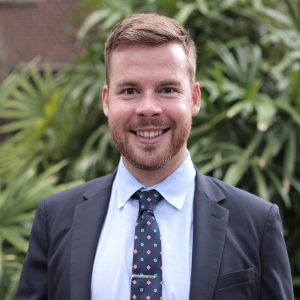Research Spotlight: Gage Jeter
 Q & A with Gage Jeter, Ph.D., Clinical Assistant Professor in the School of Teaching and Learning
Q & A with Gage Jeter, Ph.D., Clinical Assistant Professor in the School of Teaching and Learning
What basic questions does your research seek to answer?
In what ways do online doctoral students experience academic writing processes, and how might structured online writing supports influence their writing processes and products within and beyond their experience in a primarily online program?
How do preservice teachers engage in critical and social justice literacy practices in both online and face-to-face spaces?
What critical incidents influence queer faculty experiences, and how might intentionally and collaboratively reflecting on those experiences act against heteronormative and hegemonic systems and spaces?
What makes your work interesting?
I think my work is interesting because, on the whole, it focuses on multiple and multimodal literacy practices in a variety of contexts, for distinct purposes, and for a plethora of audiences. I like to consider how “texts” (in every sense of the term) matter for us personally and professionally and what/how we read, say, think, hear, write, and much more influences our (and others’) literacy processes in and beyond our profession.
What are you currently working on?
I have a few ongoing projects that are particularly exciting. First, as coordinator of the Ed.D. program in Curriculum and Instruction housed in the Teachers, Schools, and Society (TSS) program area, I am collaborating with graduate students and colleagues to craft and implement authentic, embedded online writing supports for our Ed.D. students. Features of these supports include video tutorials, collaborative discussion assignments, and writing workshop activities. We are in the early stages of this work, and I look forward to launching our supports when our next cohort begins in Summer 2020.
In addition, I, alongside one of the TSS PhD students, am studying the college’s introductory to education course (EDF 1005) and how students — in both online and face-to-face spaces — engage in critical and social justice literacy practices as they consider current controversies in the education area through historical, philosophical, and sociological lenses.
Working with fellow queer colleagues in the School of Teaching and Learning, a third project of interest is a collective self-study centered on critical incidents and subsequent reflections of our experiences as queer faculty members. We aim to challenge and act against heteronormative systems and spaces as we engage in intentional conversations centered on navigating critical incidents and countering hegemonic structures.





